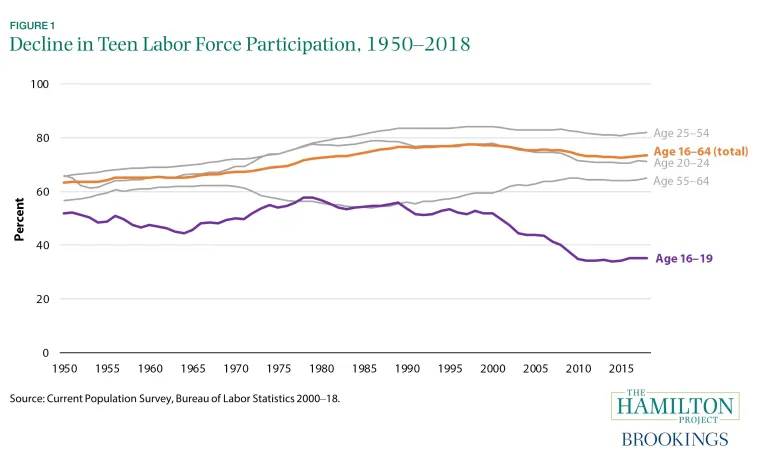If you’re wondering if your teen should have a job, you’re not alone. Many parents have asked that same question. In this article, we highlight the expertise of a Child Psychologist about the importance of part-time jobs for teens and share our list of the top 5 jobs for working-age students.
Do teenagers need early job experience or is it enough that they learn to manage their school schedule, homework, sports, and chores? Should teenagers work while they are students and if so, what are the benefits of teens working?
Table of Contents
- Should a Teenager Work While in School?
- What Percentage of Teens Work a Part-Time Job?
- How Many Hours Should Teens Work?
- Consequences of Teens Not Working
- Child Labor Law Restrictions
- Pros and Cons of Teens Working
- EQ v. IQ
- Preparing Elementary-Aged Children for the Workforce
- Best Jobs for Teens to Work
- Conclusion
Should a Teenager Work While in School?
An article published by Walden University stated the following facts and asked an important question.
“Nearly 30% of high school students are employed in a job for at least a portion of the school year. For many, working a job provides spending money for a social life.
Walden University – Online Doctorate Program Article
For others, working is necessary to help the family make ends meet or to save for college.
But outside of the money earned, is being employed while learning a good thing?”
In today’s fast-paced world, high school students are often overwhelmed with academic demands and extracurricular activities. The prevailing belief is that school should be their primary focus. However, overlooking the value of part-time jobs can lead to missed opportunities for vital skill-building outside of academics.
Participating in initial employment opportunities, like serving ice cream or being employed at a dining establishment, can teach crucial life skills and cultivate a feeling of accountability in adolescents.
They learn valuable skills such as effective communication, time management, and dealing with real-world challenges.
Are Good Grades More Important Than Working?
While students need good grades, part-time jobs provide unique learning experiences that the classroom cannot replicate.
Working in a team, handling customer interactions, and managing work-life balance are invaluable skills for personal growth and future success.
Teenagers can learn important skills for adulthood by finding a balance between school and work. Parents can support and supervise teenagers to help them balance part-time work and school. This support and supervision ensures that their studies are not affected. Additionally, it allows them to still benefit from the job.
Part-time jobs for teens can benefit their education, personal growth, and overall well-being. These benefits cannot be achieved through academic success alone.
Related Article: Should Students Get Paid for Good Grades?
Don’t Teens Miss Out on Good Life Experiences By Not Working?
Unfortunately, this mentality comes at a price, warns child psychologist, Dr. Jennifer Gatt. “This is all fine and good. But what about the rich life experience of engaging in your first part-time job? Scooping ice cream, seating others at a restaurant, or bussing tables.
These first jobs are often not glamorous. To the contrary, they are often quite labor intensive, and unlike any other chores and tasks that are required of us in other areas of our lives.”
Benefits Teens Get from Working
Dr. Gatt is concerned that numerous students are losing crucial years of developing skills in areas outside of the classroom.
Dr. Gatt says that by working, teens learn:
- To communicate with co-workers, their boss, and frequently the public.
- Planning skills in order to be on time (time management, and promptness) and prepared (showered and groomed)
- How to be congenial when feeling tired, stressed, or overwhelmed.
She continues, “They learn these 3 important life skills all while trying to juggle personal and educational needs.
Teens sometimes have big emotions, and they figure out how to put on a smile and put their own needs to the side to perform a duty politely.”
Job Benefits They Won’t Learn in the Classroom
Dr. Gatt says these skills are different from classroom learning and are important for life. “The family is the perfect first training ground for these types of skills. However, the first job is the natural next step in honing these abilities.
As a parent, you want your kids to learn from their mistakes and seek help from unbiased people outside the family. They need a place where they can take responsibility for their actions. They also need a place where they can adapt to work and personal demands.
Additionally, they need a place where they can make mistakes and bounce back, especially when the consequences are not serious.
What Percentage of Teens Work a Part-Time Job?
The percentage of teens in the workforce is at an all-time low according to the Brookings Institute.
“The teen labor force participation rate reached an all-time peak in 1979 (57.9 percent) and gradually declined until about 2000, when it then dropped precipitously to a 2010–18 plateau of about 35 percent.”
Source: Brookings.edu Blog

Image courtesy of Brookings.edu
How Many Hours Should Teens Work?
Determining how much your teen should work while they’re in school is not cut and dry. It depends on several factors including how busy your child is with other obligations, how much time their school work demands, and how much they need to work if their job is providing their own financial support or support for the family.
As a good rule of thumb, a teen should generally not work more than 20 hours a week. Anything beyond that will probably be too much if they are also juggling all the responsibilities of being a student.
Studies from 1980 to now show that working over 20 hours a week harms a teen’s school performance.
- Science Daily Research: Working more than 20 hours a week in high school was found harmful
- University of Washington Research: Working more than 20 hours a week in high school can harm grades
- National Consumer League Research: Working more than 20 hours a week is a bad idea for teens.
A job that requires 10-16 hours a week would be a good fit for most teenagers. This amount of time will feel significant, but shouldn’t interfere with their other duties.
Deciding how much time is appropriate for your teen might involve some trial and error. Most jobs that employ teenagers provide flexibility on hours and shifts so they can adjust as their schedules demand. If your child is getting overwhelmed, they might be working too much or simply not managing their time well enough. Once you’ve assessed they can make the necessary changes.
Children must face challenges for their growth, even though it may be difficult for us to witness. Learning time management and prioritization isn’t easy, but it is an important benefit of this first real-world experience.
Consequences of Teens Not Working
Dr. Gatt is raising the alarm about the consequences of this trend. “First jobs create intense pride, self-confidence, humility, and self-awareness. Kids who would never take out the garbage at home suddenly are waking up at 5 am to get to a job where they have to visit the dumpster multiple times a day. Without a parent nagging and cajoling, a sense of responsibility takes over, and teens start growing into young adults.
How can we expect a college graduate to start working a grown-up job without this foundational experience before the stakes are so high?
First jobs help teenagers transition from doing chores for an allowance. This new job helps them become young adults who work for a sense of pride, accomplishment and a paycheck from an employer.
Dr. Gatt says that there is nothing like a first job to stimulate a teen’s sense of internal motivation and self-efficacy. “The goal is to develop self-motivated adults. These individuals should take pride in their work, effectively handle challenges and mistakes, and be motivated by factors beyond financial gain. Additionally, they should experience a sense of accomplishment, independence, and personal success. They should also feel a sense of achievement, independence, and success.”
Child Labor Law Restrictions
The federal government has put some restrictions in place to protect students from overworking and from dangerous jobs.
These are some of the rules in the Fair Labor Standards Act of 1938, published by the U.S. Department of Labor.
Minimum Age for Employment: The Act sets a minimum age of 14 for most non-agricultural work, with some exceptions.
Hazardous Occupations: The Act identifies hazardous occupations that are considered too dangerous for minors under the age of 18. These occupations include mining, manufacturing explosives, operating heavy machinery, and more.
Hours of Work: The Act limits the number of hours and times of day that minors under 16 can work during school hours. It also restricts the hours and times of day that minors under 18 can work in hazardous jobs.
School Attendance: The Act requires that minors under 16 attend school during normal school hours, even if they are employed. It aims to ensure that work does not interfere with a child’s education.
Prohibited Industries: The Act prohibits minors from working in specific industries such as gambling, liquor, and certain entertainment venues, where they may be exposed to harmful or inappropriate situations.
Parental Consent: Some occupations deemed less hazardous allow minors under 18 to work longer hours, but only with parental consent or under parental supervision.
Agricultural Work: While some agricultural work is exempt from certain provisions, the Act places restrictions on the type of work and hours for minors under 16 in agriculture.
Penalties for Violation: The Act establishes penalties for employers who violate child labor laws, including fines and potential imprisonment.
Permitted Work: The Act encompasses exceptions and stipulations for particular kinds of jobs, like child care, newspaper delivery, and entertainment performances, under certain circumstances.
State Laws: State child labor laws may be stricter than federal laws, and employers are required to follow the more protective standard. You can read the entire child labor law guidelines on the U.S. Department of Labor website.
Pros and Cons of Teens Working
Here is a quick reference list of the pros and cons of your student having a part-time job while they are in high school.
Pros – Positive Aspects of Teens Working:
- Jobs help adolescents develop a sense of responsibility and accountability, as they learn to fulfill work commitments and manage tasks independently.
- Having a job can contribute to teenagers’ personal growth, as they gain a greater sense of self-identity and purpose through their work experiences.
- Teens working a reasonable amount of hours, typically less than 15 hours a week, may exhibit improved academic performance, as they learn to balance work and school responsibilities effectively.
- Employment provides an opportunity for teens to learn essential financial management skills and gain a better understanding of personal finance, fostering financial literacy early on.
- Engaging in part-time jobs can aid teenagers in the transition from youth to adulthood, helping them develop valuable life skills and work-related competencies.
- Working a job helps a teen to develop an emotional quotient (read more below)
Cons – Negative Aspects of Teens Working
- Jobs can introduce additional stress into a teenager’s life, potentially leading to difficulties in managing schoolwork, extracurricular activities, and work responsibilities.
- The work environment may expose teenagers to people and situations for which they might not be emotionally or socially prepared, presenting challenges in navigating unfamiliar scenarios.
- Some teens working jobs might feel like their childhood is ending too soon, as they have to assume adult-like responsibilities and face the demands of the workforce prematurely.
- Adolescents who work excessively, usually more than 15 hours a week, might experience a decline in their academic performance due to time constraints and exhaustion from juggling multiple commitments.
- Teenagers with income from their jobs might be tempted to spend their money on potentially harmful substances or activities, such as alcohol or tobacco, if not guided in making responsible financial decisions.
EQ v. IQ
Developing a student’s EQ versus IQ is an important part of maturing.
What is IQ?
IQ is often measured by abilities in the areas of logic, problem-solving, math, and language. While you might learn some of these skills in the workplace, most early learning comes through school. IQ is necessary and important, but it is not enough.
Academic success largely hinges on IQ or intelligence quotient.
What is EQ?
EQ represents a person’s emotional quotient or emotional intelligence. It is also incredibly important and tends to be learned and honed in more real-life situations. Kids learn EQ early at school, but less so in the classroom, and more so on the playground. EQ is a measure of how we can read a room and interact with others. It measures self-awareness, motivation, empathy, and emotional regulation.
The Value of Developing an Emotional Quotient (EQ)
The problem with teens focusing exclusively on high school subjects, and abandoning this real-life learning opportunity, is that they are missing out on an opportunity to build their Emotional Quotient (EQ).
The History of EQ
Until the early ’90s, EQ was a relatively obscure idea. In 1995 a book by Daniel Goleman entitled Emotional Intelligence – Why it can matter more than IQ, hit the scenes.
This book catapulted to best-selling status, and the world never looked back. Goleman followed up his book with an article in the Harvard Business Review in which he argued for the importance of EQ in leadership. Since then, several studies have supported his thesis.
The argument for the importance of EQ seems pretty self-explanatory to parents. We dedicate an outsized amount of time trying to teach our kids to regulate emotions, keep their hands to themselves, comfort friends, share toys, and just generally behave in socially acceptable ways (less public nose picking, more pleases and thank yous).
Teen Jobs Can Help Build EQ
It is easy to see how kids who are engaged in academic endeavors at school 8-10 hours a day and then bury their noses in high school homework for another 2-3, are missing out on vital opportunities to build EQ. One of the core benefits of an early job, even just a few hours a week, is the required interaction with strangers.
Teens build EQ skills in relation to family, friends, classmates, and teachers throughout early childhood and into their teens.
However, their opportunities to build those same skills as they relate to strangers are more limited. First jobs can fill that gap and teach teens how to interact with managers, bosses, co-workers, and the public. Learning how to manage those relationships will be vital for real-world circumstances and occupations.
Preparing Elementary-Aged Children for the Workforce
If you’re looking at your less than exceptionally motivated elementary-aged kids and wondering how on earth they’re ever going to be able to scoop ice cream at Baskin Robbins if they can’t even make their beds, you’re not alone.
Fear not.
Kids are ever-evolving, learning, and growing creatures, who are absolutely capable of making the transition one day. Just remember when you thought they’d never get out of diapers. Then Voila! Big kid underwear.
Kids are magic. It’s our job to shepherd them into the incredible people they can become.
If your kids have a few years before they can carry a tray without dropping it on a customer, Dr. Gatt has some recommendations for early skill-building:
“This same sense of accomplishment is achieved through a well-structured chore and allowance program.
Kids feel a sense of accomplishment, self-sufficiency, and pride in seeing the outcome of their specific task. Clean rooms, made beds and folded laundry can reinforce the positive outcome of earning. Young kids can earn privileges or money.
However it is structured, this positive reinforcement is directly linked to one’s sense of self-reliance.”
Best Jobs for Teens to Work
If your teen rolls out of bed 5 minutes before the bus comes and barely gets their shoes on, you might now be actively searching for job listings. Here is our list of top categories that will benefit high school students.
1. Movie Theaters

Asking patrons how much butter they want on their popcorn might not be glamorous, but it has its perks. Movie theater jobs tend to have flexible schedules and plenty of part-time shifts.
If you’re a teenager, chances are you like to go to movies with friends, so perks such as free tickets and popcorn could save you real money.
In addition to the work benefits, there are psychological benefits of a job that requires you to interact with the public.
Teens learn to listen, help, and direct customers, smile even on rough days, be on time (time-management), do humble jobs such as sweeping up someone else’s popcorn, bond with coworkers, trade shifts, shower, and dress appropriately.
2. Restaurant Jobs

Waiter and Waitress jobs at nice restaurants can be hard to come by for teenagers, but they can work their way up by starting as a host/hostess or washing dishes.
Restaurant jobs frequently come with a level of stress that is new for some teens.
The environment can be fast-paced with a lot of moving parts. Patrons want their tables now. They want their appetizers yesterday.
They expect you to remember whether they want cheese, ice in their Coke, or dressing on the side. Mistakes are met with a full gamut of humanity – some patient, some not so patient, some downright rude. Managers are frequently requested, and glasses are shattered.
All of this controlled chaos makes for a great training ground for future difficult and stressful jobs.
It will build a level of resilience students desperately need as they enter the less sheltered years of their lives.
The pride they will feel after a long shift, the successful handling of a mean customer, or an afternoon of memorizing and delivering orders, will be unlike anything they’ve felt in childhood. If nothing else, they’ll forever be good tippers, and everyone likes a good tipper.
3. Childcare

Caring for children in a structured environment is a foolproof method to make your teen patient. You might just be tempted to sit outside the daycare where they’ve gotten their first job, and watch a toddler throw peas in their direction.
Children can teach us a lot, and they will teach your teen patience, kindness, humility, and the value of cleanliness, and did I mention patience?
Daycare centers also follow very strict protocols, from the handling of food to the documentation of booboos.
Teens will learn how to comply with legal regulations, even if they think they’re pointless or dumb. They will have to read the emotions of toddlers who can’t necessarily communicate their feelings verbally.
Little kids look up to and emulate teens, so your teen will see how their behavior has a direct impact on those younger than them.
And, at the end of the day, they will get to experience the beautiful happiness of babies and children. Making kids happy with stories, books, music, and jokes make it all worthwhile.
4. Grocery and Retail Stores

Stocking, checking, and managing are all excellent options for teenagers looking for a first job. Eventually they can work their way up into other positions, stocking shelves and cashiering.
There are perks associated with discounts, depending on the store, and the shift flexibility will allow them to work around their high school, sport, and family obligations.
Retail also offers some unique opportunities for seasonal work around holidays and busy seasons.
Teenagers will end up spending a lot of time on their feet in these positions, interacting with the public.
There is a wide variety of specific job types, from checking to stocking, but each requires some interaction with the public. They will learn to be polite. They will quickly respond to managers’ urgent requests. They will arrange products. They will check prices. They will enter inventory data. They will not eat their colleagues’ food in the staff fridge.
5. Retirement Homes

On the opposite end of the age spectrum as childcare, retirement, and care facilities also provide excellent job opportunities for high school students.
These positions often require students to exercise and hone various skills, from kitchen and meal prep to emergency medical care.
In certain care facilities, the residents might have cognitive impairments which require significant levels of patience, kindness, and empathy.
Teens will interact with, and learn to respect, their elders. They will come to understand that with age often comes wisdom and that sitting down for a game of chess with someone’s grandfather might just teach them more than how to castle a king and a rook.
This is a job where a teen will feel truly needed.
Residents often take an interest in the lives of the employees and care about them quite a bit. Teens will be able to have a true impact on the lives of others.
In addition to the usual requirements of showing up on time, and showered, students will learn about the world outside their little bubble.
Elder care can involve big issues around other people’s family dynamics, inheritance issues, loves, and losses. Sometimes teens can take a very myopic view of the world, and forget that there is a world outside of themselves that they can affect in a positive way.
Conclusion
Teenagers have a lot on their plates, and it might seem daunting for you and them to add one more thing.
Your student might already seem overwhelmed with high school, extracurriculars, and sports.
Consider, however, how the skills and work experience they would learn in a job could help them manage all of those things, and prepare for college and future employment.
The vast majority of our kids aren’t going to be pro athletes, but we still put them in plenty of sports. We recognize that sports teach lessons outside of the specific skills involved.
Teen jobs are very similar. We all have hopes for our kids beyond asking whether you would like hot fudge and nuts on top of your sundae, and sleepily dragging trash to a curb after a long shift.
What we must learn to realize is that those hopes will be more readily realized if our children acquire the underlying competence that those jobs bring.
Responsibility, self-sufficiency, confidence, grit, humility, empathy, patience, and resilience are not only job skills, they’re life skills.
